Leadership and Management for Service Industries
VerifiedAdded on 2022/11/28
|12
|3399
|1
AI Summary
Contribute Materials
Your contribution can guide someone’s learning journey. Share your
documents today.
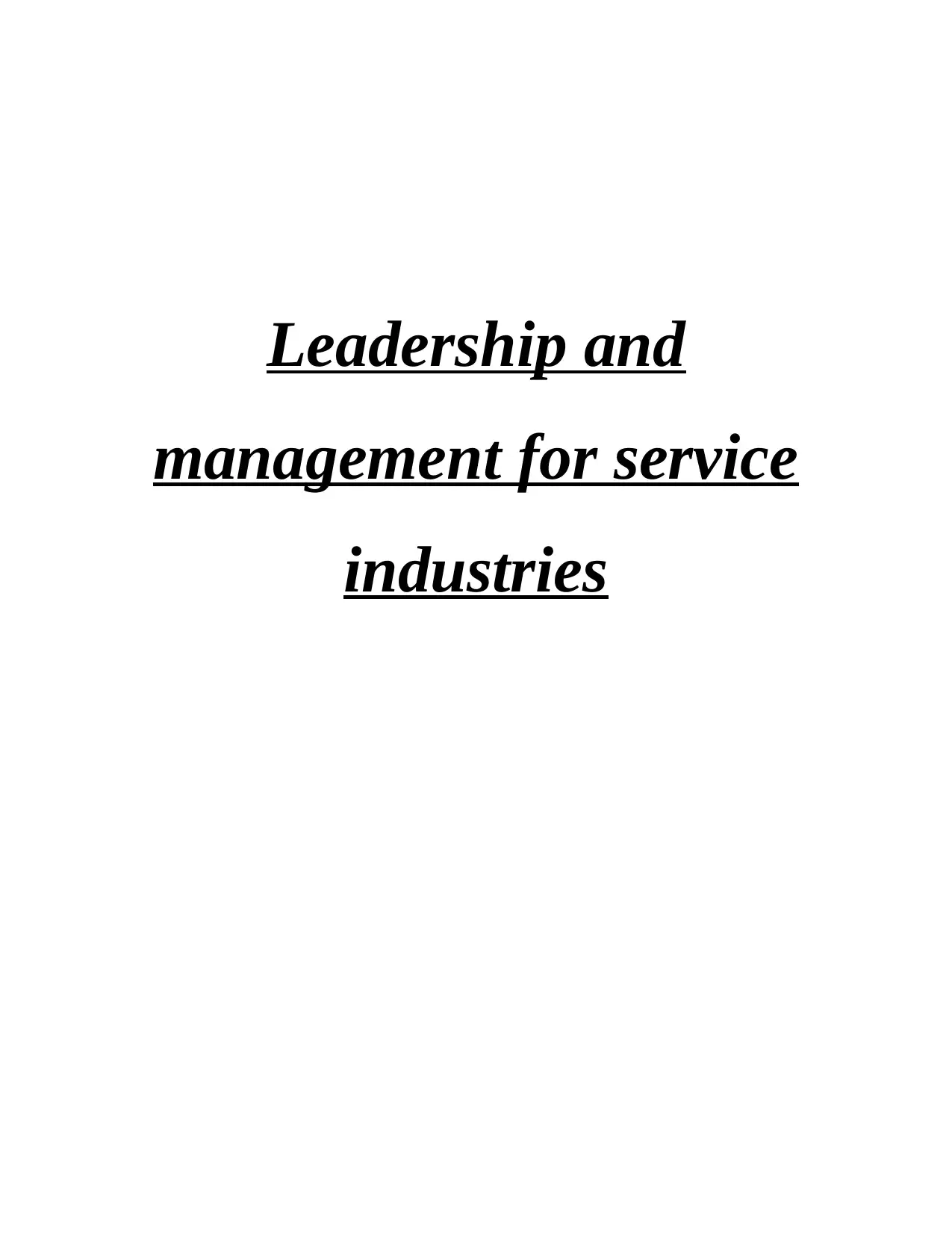
Leadership and
management for service
industries
management for service
industries
Secure Best Marks with AI Grader
Need help grading? Try our AI Grader for instant feedback on your assignments.
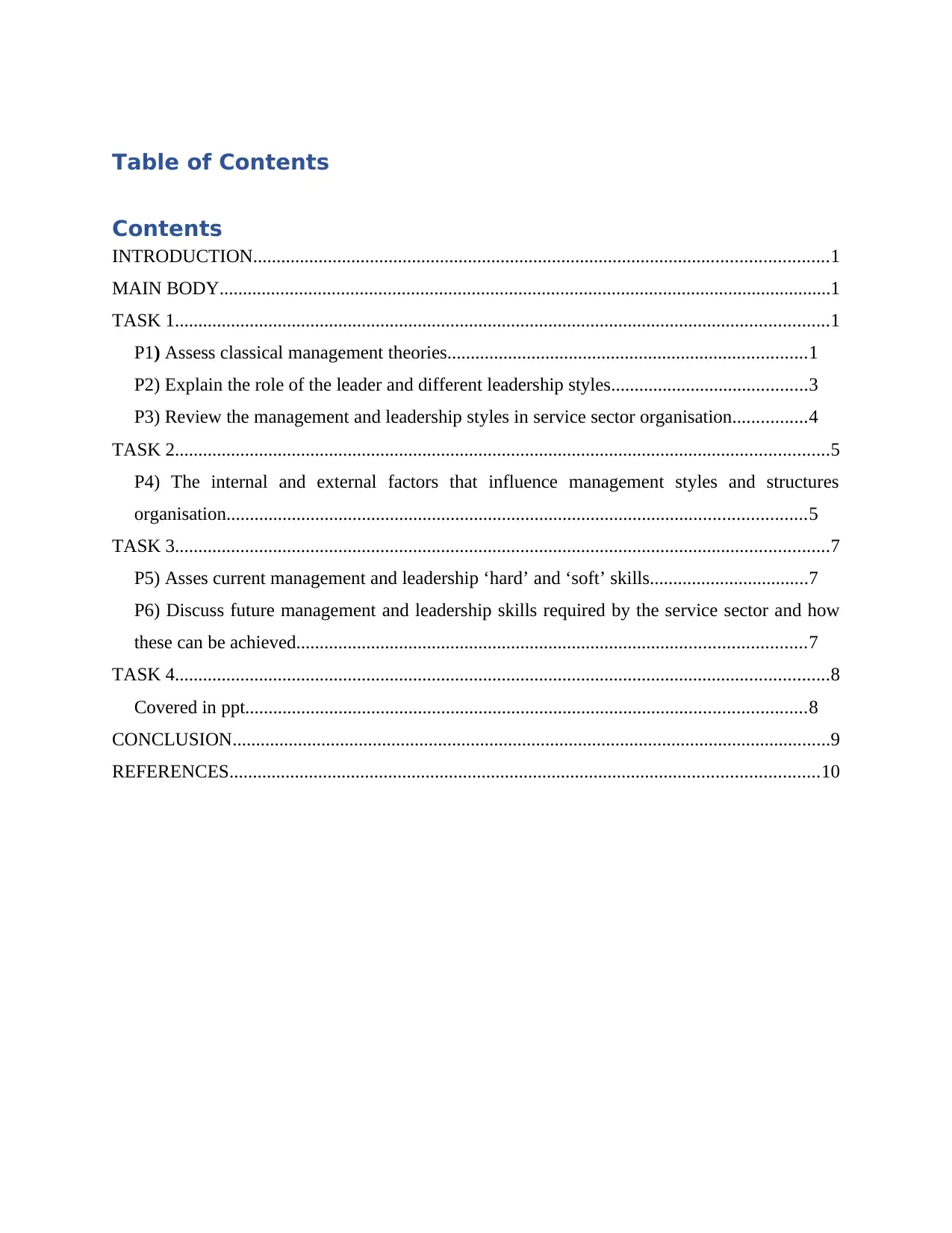
Table of Contents
Contents
INTRODUCTION...........................................................................................................................1
MAIN BODY...................................................................................................................................1
TASK 1............................................................................................................................................1
P1) Assess classical management theories.............................................................................1
P2) Explain the role of the leader and different leadership styles..........................................3
P3) Review the management and leadership styles in service sector organisation................4
TASK 2............................................................................................................................................5
P4) The internal and external factors that influence management styles and structures
organisation............................................................................................................................5
TASK 3............................................................................................................................................7
P5) Asses current management and leadership ‘hard’ and ‘soft’ skills..................................7
P6) Discuss future management and leadership skills required by the service sector and how
these can be achieved.............................................................................................................7
TASK 4............................................................................................................................................8
Covered in ppt........................................................................................................................8
CONCLUSION................................................................................................................................9
REFERENCES..............................................................................................................................10
Contents
INTRODUCTION...........................................................................................................................1
MAIN BODY...................................................................................................................................1
TASK 1............................................................................................................................................1
P1) Assess classical management theories.............................................................................1
P2) Explain the role of the leader and different leadership styles..........................................3
P3) Review the management and leadership styles in service sector organisation................4
TASK 2............................................................................................................................................5
P4) The internal and external factors that influence management styles and structures
organisation............................................................................................................................5
TASK 3............................................................................................................................................7
P5) Asses current management and leadership ‘hard’ and ‘soft’ skills..................................7
P6) Discuss future management and leadership skills required by the service sector and how
these can be achieved.............................................................................................................7
TASK 4............................................................................................................................................8
Covered in ppt........................................................................................................................8
CONCLUSION................................................................................................................................9
REFERENCES..............................................................................................................................10
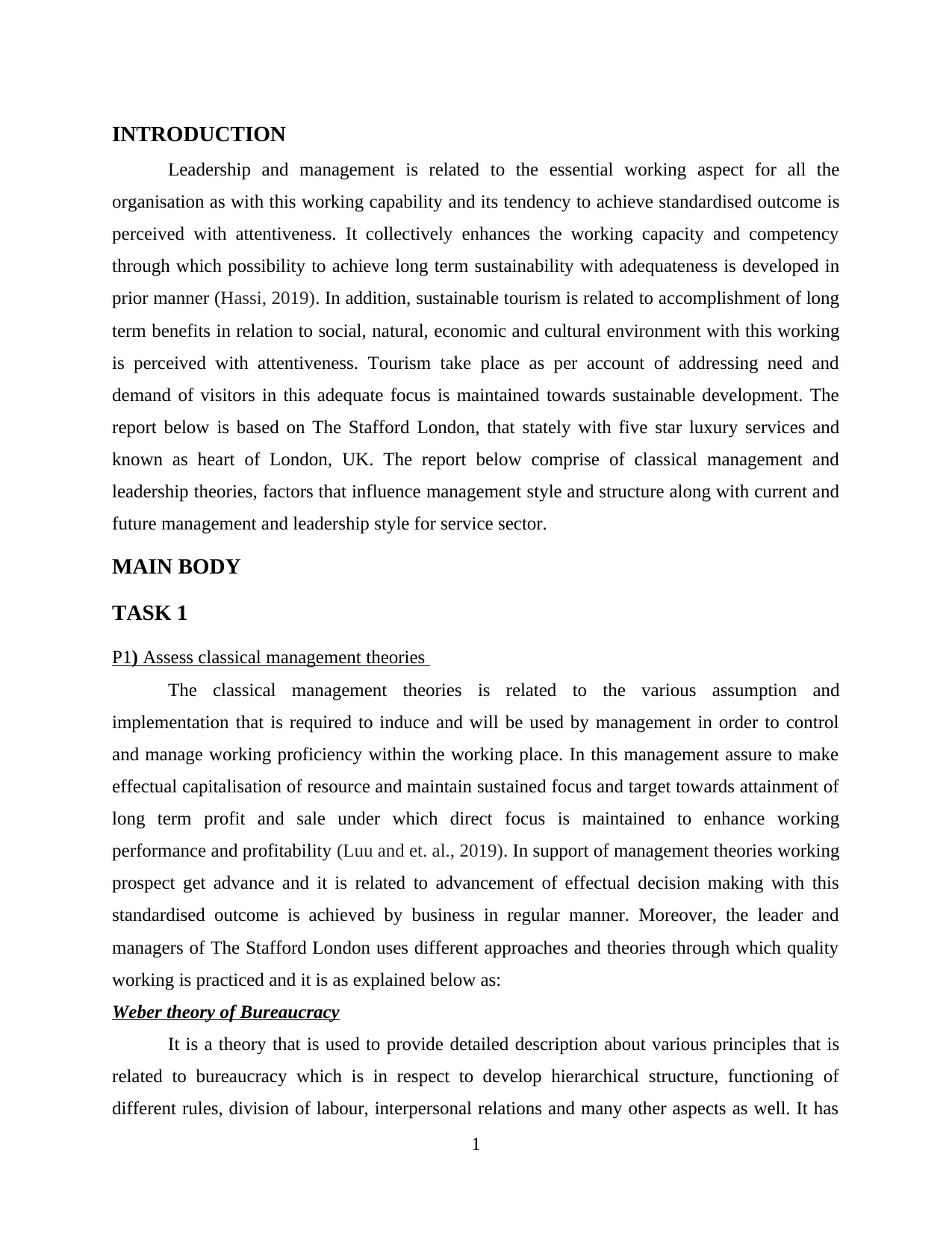
INTRODUCTION
Leadership and management is related to the essential working aspect for all the
organisation as with this working capability and its tendency to achieve standardised outcome is
perceived with attentiveness. It collectively enhances the working capacity and competency
through which possibility to achieve long term sustainability with adequateness is developed in
prior manner (Hassi, 2019). In addition, sustainable tourism is related to accomplishment of long
term benefits in relation to social, natural, economic and cultural environment with this working
is perceived with attentiveness. Tourism take place as per account of addressing need and
demand of visitors in this adequate focus is maintained towards sustainable development. The
report below is based on The Stafford London, that stately with five star luxury services and
known as heart of London, UK. The report below comprise of classical management and
leadership theories, factors that influence management style and structure along with current and
future management and leadership style for service sector.
MAIN BODY
TASK 1
P1) Assess classical management theories
The classical management theories is related to the various assumption and
implementation that is required to induce and will be used by management in order to control
and manage working proficiency within the working place. In this management assure to make
effectual capitalisation of resource and maintain sustained focus and target towards attainment of
long term profit and sale under which direct focus is maintained to enhance working
performance and profitability (Luu and et. al., 2019). In support of management theories working
prospect get advance and it is related to advancement of effectual decision making with this
standardised outcome is achieved by business in regular manner. Moreover, the leader and
managers of The Stafford London uses different approaches and theories through which quality
working is practiced and it is as explained below as:
Weber theory of Bureaucracy
It is a theory that is used to provide detailed description about various principles that is
related to bureaucracy which is in respect to develop hierarchical structure, functioning of
different rules, division of labour, interpersonal relations and many other aspects as well. It has
1
Leadership and management is related to the essential working aspect for all the
organisation as with this working capability and its tendency to achieve standardised outcome is
perceived with attentiveness. It collectively enhances the working capacity and competency
through which possibility to achieve long term sustainability with adequateness is developed in
prior manner (Hassi, 2019). In addition, sustainable tourism is related to accomplishment of long
term benefits in relation to social, natural, economic and cultural environment with this working
is perceived with attentiveness. Tourism take place as per account of addressing need and
demand of visitors in this adequate focus is maintained towards sustainable development. The
report below is based on The Stafford London, that stately with five star luxury services and
known as heart of London, UK. The report below comprise of classical management and
leadership theories, factors that influence management style and structure along with current and
future management and leadership style for service sector.
MAIN BODY
TASK 1
P1) Assess classical management theories
The classical management theories is related to the various assumption and
implementation that is required to induce and will be used by management in order to control
and manage working proficiency within the working place. In this management assure to make
effectual capitalisation of resource and maintain sustained focus and target towards attainment of
long term profit and sale under which direct focus is maintained to enhance working
performance and profitability (Luu and et. al., 2019). In support of management theories working
prospect get advance and it is related to advancement of effectual decision making with this
standardised outcome is achieved by business in regular manner. Moreover, the leader and
managers of The Stafford London uses different approaches and theories through which quality
working is practiced and it is as explained below as:
Weber theory of Bureaucracy
It is a theory that is used to provide detailed description about various principles that is
related to bureaucracy which is in respect to develop hierarchical structure, functioning of
different rules, division of labour, interpersonal relations and many other aspects as well. It has
1
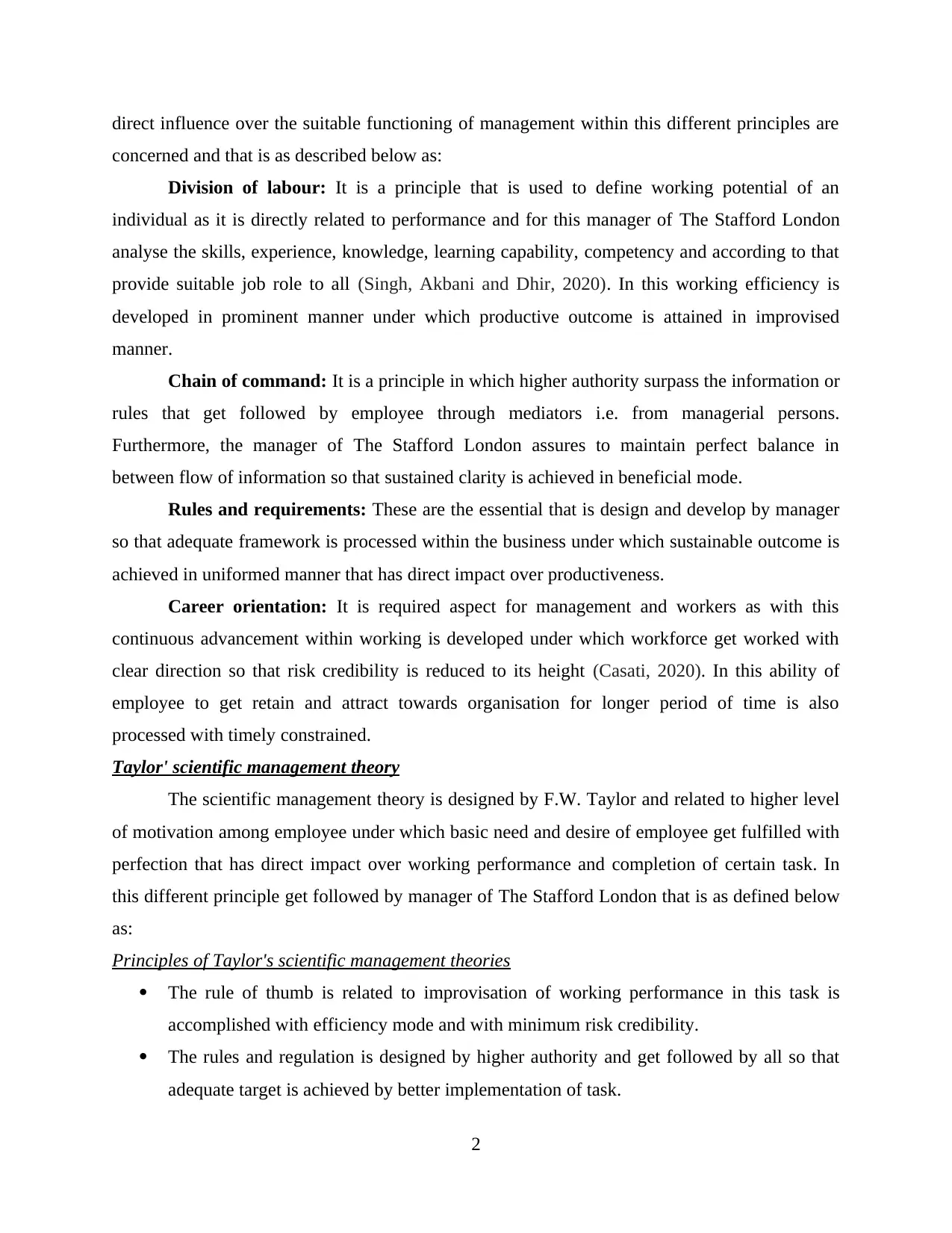
direct influence over the suitable functioning of management within this different principles are
concerned and that is as described below as:
Division of labour: It is a principle that is used to define working potential of an
individual as it is directly related to performance and for this manager of The Stafford London
analyse the skills, experience, knowledge, learning capability, competency and according to that
provide suitable job role to all (Singh, Akbani and Dhir, 2020). In this working efficiency is
developed in prominent manner under which productive outcome is attained in improvised
manner.
Chain of command: It is a principle in which higher authority surpass the information or
rules that get followed by employee through mediators i.e. from managerial persons.
Furthermore, the manager of The Stafford London assures to maintain perfect balance in
between flow of information so that sustained clarity is achieved in beneficial mode.
Rules and requirements: These are the essential that is design and develop by manager
so that adequate framework is processed within the business under which sustainable outcome is
achieved in uniformed manner that has direct impact over productiveness.
Career orientation: It is required aspect for management and workers as with this
continuous advancement within working is developed under which workforce get worked with
clear direction so that risk credibility is reduced to its height (Casati, 2020). In this ability of
employee to get retain and attract towards organisation for longer period of time is also
processed with timely constrained.
Taylor' scientific management theory
The scientific management theory is designed by F.W. Taylor and related to higher level
of motivation among employee under which basic need and desire of employee get fulfilled with
perfection that has direct impact over working performance and completion of certain task. In
this different principle get followed by manager of The Stafford London that is as defined below
as:
Principles of Taylor's scientific management theories
The rule of thumb is related to improvisation of working performance in this task is
accomplished with efficiency mode and with minimum risk credibility.
The rules and regulation is designed by higher authority and get followed by all so that
adequate target is achieved by better implementation of task.
2
concerned and that is as described below as:
Division of labour: It is a principle that is used to define working potential of an
individual as it is directly related to performance and for this manager of The Stafford London
analyse the skills, experience, knowledge, learning capability, competency and according to that
provide suitable job role to all (Singh, Akbani and Dhir, 2020). In this working efficiency is
developed in prominent manner under which productive outcome is attained in improvised
manner.
Chain of command: It is a principle in which higher authority surpass the information or
rules that get followed by employee through mediators i.e. from managerial persons.
Furthermore, the manager of The Stafford London assures to maintain perfect balance in
between flow of information so that sustained clarity is achieved in beneficial mode.
Rules and requirements: These are the essential that is design and develop by manager
so that adequate framework is processed within the business under which sustainable outcome is
achieved in uniformed manner that has direct impact over productiveness.
Career orientation: It is required aspect for management and workers as with this
continuous advancement within working is developed under which workforce get worked with
clear direction so that risk credibility is reduced to its height (Casati, 2020). In this ability of
employee to get retain and attract towards organisation for longer period of time is also
processed with timely constrained.
Taylor' scientific management theory
The scientific management theory is designed by F.W. Taylor and related to higher level
of motivation among employee under which basic need and desire of employee get fulfilled with
perfection that has direct impact over working performance and completion of certain task. In
this different principle get followed by manager of The Stafford London that is as defined below
as:
Principles of Taylor's scientific management theories
The rule of thumb is related to improvisation of working performance in this task is
accomplished with efficiency mode and with minimum risk credibility.
The rules and regulation is designed by higher authority and get followed by all so that
adequate target is achieved by better implementation of task.
2
Secure Best Marks with AI Grader
Need help grading? Try our AI Grader for instant feedback on your assignments.
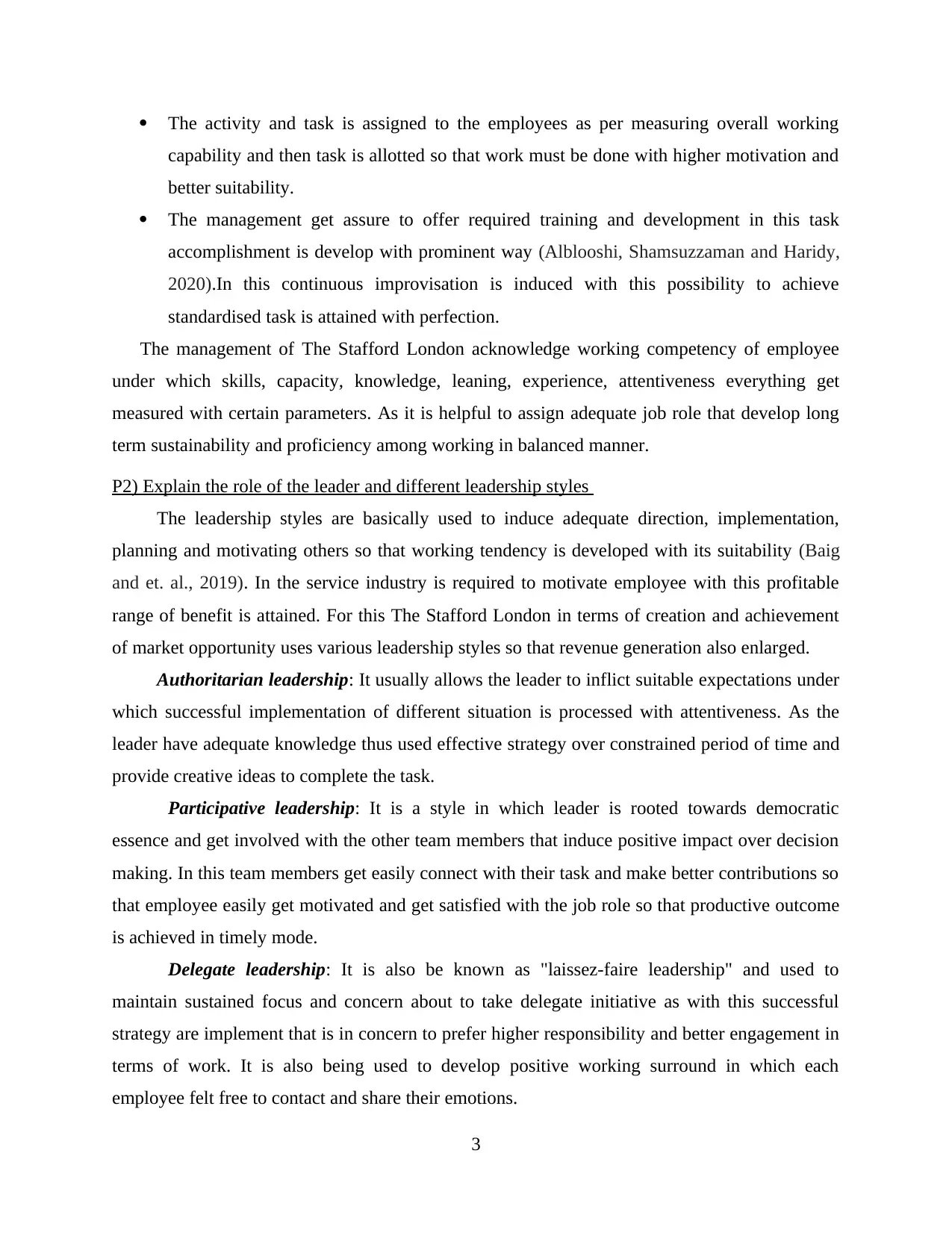
The activity and task is assigned to the employees as per measuring overall working
capability and then task is allotted so that work must be done with higher motivation and
better suitability.
The management get assure to offer required training and development in this task
accomplishment is develop with prominent way (Alblooshi, Shamsuzzaman and Haridy,
2020).In this continuous improvisation is induced with this possibility to achieve
standardised task is attained with perfection.
The management of The Stafford London acknowledge working competency of employee
under which skills, capacity, knowledge, leaning, experience, attentiveness everything get
measured with certain parameters. As it is helpful to assign adequate job role that develop long
term sustainability and proficiency among working in balanced manner.
P2) Explain the role of the leader and different leadership styles
The leadership styles are basically used to induce adequate direction, implementation,
planning and motivating others so that working tendency is developed with its suitability (Baig
and et. al., 2019). In the service industry is required to motivate employee with this profitable
range of benefit is attained. For this The Stafford London in terms of creation and achievement
of market opportunity uses various leadership styles so that revenue generation also enlarged.
Authoritarian leadership: It usually allows the leader to inflict suitable expectations under
which successful implementation of different situation is processed with attentiveness. As the
leader have adequate knowledge thus used effective strategy over constrained period of time and
provide creative ideas to complete the task.
Participative leadership: It is a style in which leader is rooted towards democratic
essence and get involved with the other team members that induce positive impact over decision
making. In this team members get easily connect with their task and make better contributions so
that employee easily get motivated and get satisfied with the job role so that productive outcome
is achieved in timely mode.
Delegate leadership: It is also be known as "laissez-faire leadership" and used to
maintain sustained focus and concern about to take delegate initiative as with this successful
strategy are implement that is in concern to prefer higher responsibility and better engagement in
terms of work. It is also being used to develop positive working surround in which each
employee felt free to contact and share their emotions.
3
capability and then task is allotted so that work must be done with higher motivation and
better suitability.
The management get assure to offer required training and development in this task
accomplishment is develop with prominent way (Alblooshi, Shamsuzzaman and Haridy,
2020).In this continuous improvisation is induced with this possibility to achieve
standardised task is attained with perfection.
The management of The Stafford London acknowledge working competency of employee
under which skills, capacity, knowledge, leaning, experience, attentiveness everything get
measured with certain parameters. As it is helpful to assign adequate job role that develop long
term sustainability and proficiency among working in balanced manner.
P2) Explain the role of the leader and different leadership styles
The leadership styles are basically used to induce adequate direction, implementation,
planning and motivating others so that working tendency is developed with its suitability (Baig
and et. al., 2019). In the service industry is required to motivate employee with this profitable
range of benefit is attained. For this The Stafford London in terms of creation and achievement
of market opportunity uses various leadership styles so that revenue generation also enlarged.
Authoritarian leadership: It usually allows the leader to inflict suitable expectations under
which successful implementation of different situation is processed with attentiveness. As the
leader have adequate knowledge thus used effective strategy over constrained period of time and
provide creative ideas to complete the task.
Participative leadership: It is a style in which leader is rooted towards democratic
essence and get involved with the other team members that induce positive impact over decision
making. In this team members get easily connect with their task and make better contributions so
that employee easily get motivated and get satisfied with the job role so that productive outcome
is achieved in timely mode.
Delegate leadership: It is also be known as "laissez-faire leadership" and used to
maintain sustained focus and concern about to take delegate initiative as with this successful
strategy are implement that is in concern to prefer higher responsibility and better engagement in
terms of work. It is also being used to develop positive working surround in which each
employee felt free to contact and share their emotions.
3
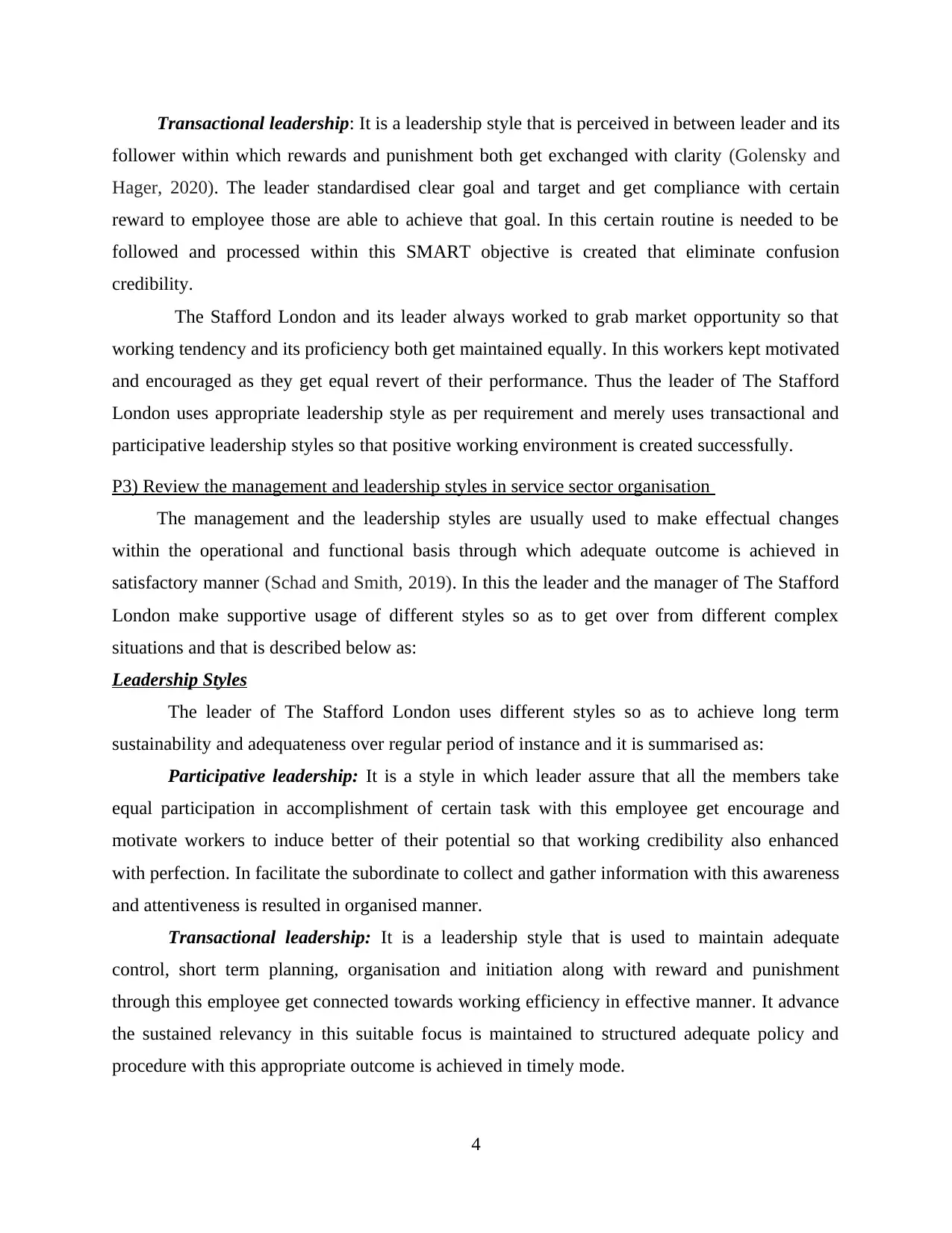
Transactional leadership: It is a leadership style that is perceived in between leader and its
follower within which rewards and punishment both get exchanged with clarity (Golensky and
Hager, 2020). The leader standardised clear goal and target and get compliance with certain
reward to employee those are able to achieve that goal. In this certain routine is needed to be
followed and processed within this SMART objective is created that eliminate confusion
credibility.
The Stafford London and its leader always worked to grab market opportunity so that
working tendency and its proficiency both get maintained equally. In this workers kept motivated
and encouraged as they get equal revert of their performance. Thus the leader of The Stafford
London uses appropriate leadership style as per requirement and merely uses transactional and
participative leadership styles so that positive working environment is created successfully.
P3) Review the management and leadership styles in service sector organisation
The management and the leadership styles are usually used to make effectual changes
within the operational and functional basis through which adequate outcome is achieved in
satisfactory manner (Schad and Smith, 2019). In this the leader and the manager of The Stafford
London make supportive usage of different styles so as to get over from different complex
situations and that is described below as:
Leadership Styles
The leader of The Stafford London uses different styles so as to achieve long term
sustainability and adequateness over regular period of instance and it is summarised as:
Participative leadership: It is a style in which leader assure that all the members take
equal participation in accomplishment of certain task with this employee get encourage and
motivate workers to induce better of their potential so that working credibility also enhanced
with perfection. In facilitate the subordinate to collect and gather information with this awareness
and attentiveness is resulted in organised manner.
Transactional leadership: It is a leadership style that is used to maintain adequate
control, short term planning, organisation and initiation along with reward and punishment
through this employee get connected towards working efficiency in effective manner. It advance
the sustained relevancy in this suitable focus is maintained to structured adequate policy and
procedure with this appropriate outcome is achieved in timely mode.
4
follower within which rewards and punishment both get exchanged with clarity (Golensky and
Hager, 2020). The leader standardised clear goal and target and get compliance with certain
reward to employee those are able to achieve that goal. In this certain routine is needed to be
followed and processed within this SMART objective is created that eliminate confusion
credibility.
The Stafford London and its leader always worked to grab market opportunity so that
working tendency and its proficiency both get maintained equally. In this workers kept motivated
and encouraged as they get equal revert of their performance. Thus the leader of The Stafford
London uses appropriate leadership style as per requirement and merely uses transactional and
participative leadership styles so that positive working environment is created successfully.
P3) Review the management and leadership styles in service sector organisation
The management and the leadership styles are usually used to make effectual changes
within the operational and functional basis through which adequate outcome is achieved in
satisfactory manner (Schad and Smith, 2019). In this the leader and the manager of The Stafford
London make supportive usage of different styles so as to get over from different complex
situations and that is described below as:
Leadership Styles
The leader of The Stafford London uses different styles so as to achieve long term
sustainability and adequateness over regular period of instance and it is summarised as:
Participative leadership: It is a style in which leader assure that all the members take
equal participation in accomplishment of certain task with this employee get encourage and
motivate workers to induce better of their potential so that working credibility also enhanced
with perfection. In facilitate the subordinate to collect and gather information with this awareness
and attentiveness is resulted in organised manner.
Transactional leadership: It is a leadership style that is used to maintain adequate
control, short term planning, organisation and initiation along with reward and punishment
through this employee get connected towards working efficiency in effective manner. It advance
the sustained relevancy in this suitable focus is maintained to structured adequate policy and
procedure with this appropriate outcome is achieved in timely mode.
4
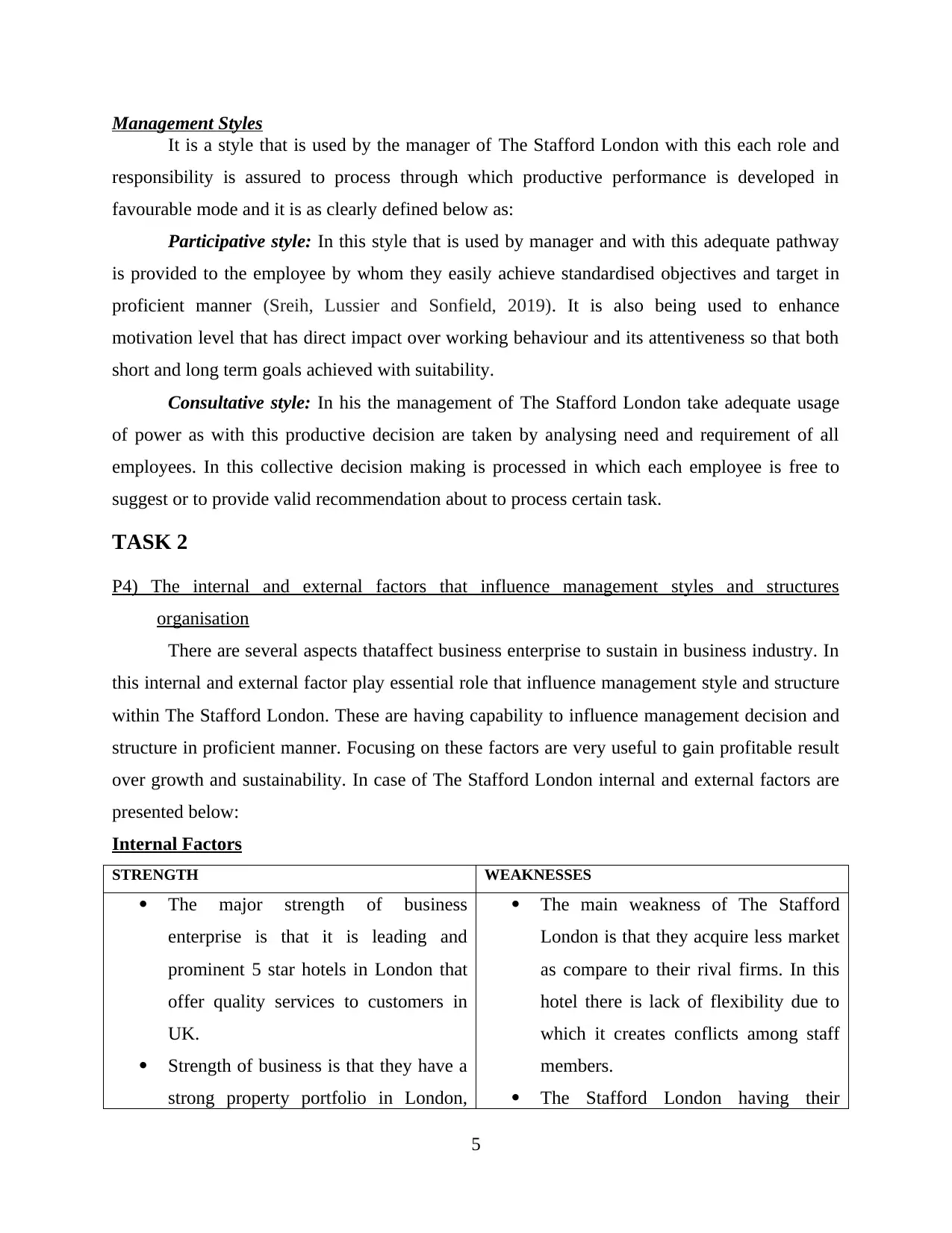
Management Styles
It is a style that is used by the manager of The Stafford London with this each role and
responsibility is assured to process through which productive performance is developed in
favourable mode and it is as clearly defined below as:
Participative style: In this style that is used by manager and with this adequate pathway
is provided to the employee by whom they easily achieve standardised objectives and target in
proficient manner (Sreih, Lussier and Sonfield, 2019). It is also being used to enhance
motivation level that has direct impact over working behaviour and its attentiveness so that both
short and long term goals achieved with suitability.
Consultative style: In his the management of The Stafford London take adequate usage
of power as with this productive decision are taken by analysing need and requirement of all
employees. In this collective decision making is processed in which each employee is free to
suggest or to provide valid recommendation about to process certain task.
TASK 2
P4) The internal and external factors that influence management styles and structures
organisation
There are several aspects thataffect business enterprise to sustain in business industry. In
this internal and external factor play essential role that influence management style and structure
within The Stafford London. These are having capability to influence management decision and
structure in proficient manner. Focusing on these factors are very useful to gain profitable result
over growth and sustainability. In case of The Stafford London internal and external factors are
presented below:
Internal Factors
STRENGTH WEAKNESSES
The major strength of business
enterprise is that it is leading and
prominent 5 star hotels in London that
offer quality services to customers in
UK.
Strength of business is that they have a
strong property portfolio in London,
The main weakness of The Stafford
London is that they acquire less market
as compare to their rival firms. In this
hotel there is lack of flexibility due to
which it creates conflicts among staff
members.
The Stafford London having their
5
It is a style that is used by the manager of The Stafford London with this each role and
responsibility is assured to process through which productive performance is developed in
favourable mode and it is as clearly defined below as:
Participative style: In this style that is used by manager and with this adequate pathway
is provided to the employee by whom they easily achieve standardised objectives and target in
proficient manner (Sreih, Lussier and Sonfield, 2019). It is also being used to enhance
motivation level that has direct impact over working behaviour and its attentiveness so that both
short and long term goals achieved with suitability.
Consultative style: In his the management of The Stafford London take adequate usage
of power as with this productive decision are taken by analysing need and requirement of all
employees. In this collective decision making is processed in which each employee is free to
suggest or to provide valid recommendation about to process certain task.
TASK 2
P4) The internal and external factors that influence management styles and structures
organisation
There are several aspects thataffect business enterprise to sustain in business industry. In
this internal and external factor play essential role that influence management style and structure
within The Stafford London. These are having capability to influence management decision and
structure in proficient manner. Focusing on these factors are very useful to gain profitable result
over growth and sustainability. In case of The Stafford London internal and external factors are
presented below:
Internal Factors
STRENGTH WEAKNESSES
The major strength of business
enterprise is that it is leading and
prominent 5 star hotels in London that
offer quality services to customers in
UK.
Strength of business is that they have a
strong property portfolio in London,
The main weakness of The Stafford
London is that they acquire less market
as compare to their rival firms. In this
hotel there is lack of flexibility due to
which it creates conflicts among staff
members.
The Stafford London having their
5
Paraphrase This Document
Need a fresh take? Get an instant paraphrase of this document with our AI Paraphraser
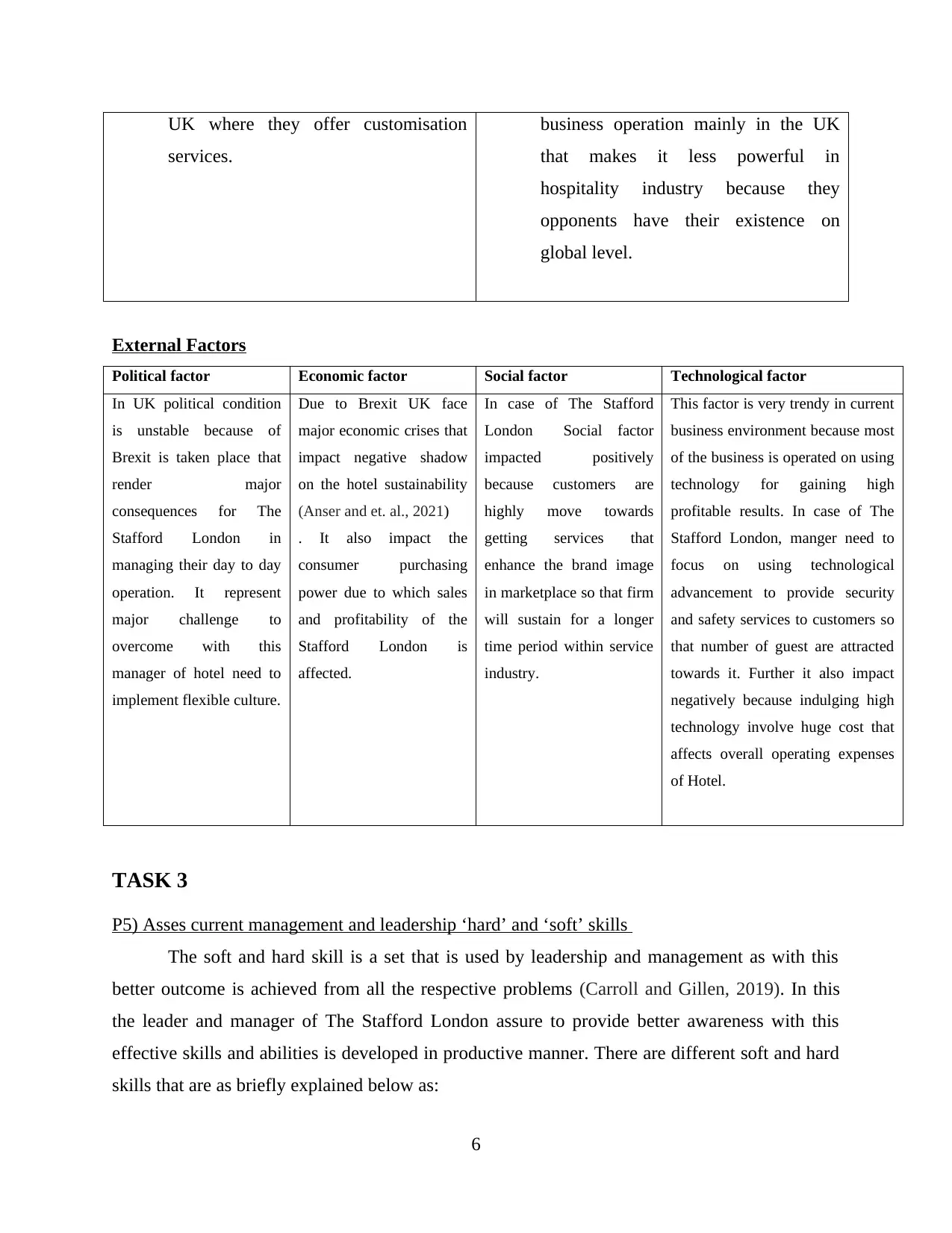
UK where they offer customisation
services.
business operation mainly in the UK
that makes it less powerful in
hospitality industry because they
opponents have their existence on
global level.
External Factors
Political factor Economic factor Social factor Technological factor
In UK political condition
is unstable because of
Brexit is taken place that
render major
consequences for The
Stafford London in
managing their day to day
operation. It represent
major challenge to
overcome with this
manager of hotel need to
implement flexible culture.
Due to Brexit UK face
major economic crises that
impact negative shadow
on the hotel sustainability
(Anser and et. al., 2021)
. It also impact the
consumer purchasing
power due to which sales
and profitability of the
Stafford London is
affected.
In case of The Stafford
London Social factor
impacted positively
because customers are
highly move towards
getting services that
enhance the brand image
in marketplace so that firm
will sustain for a longer
time period within service
industry.
This factor is very trendy in current
business environment because most
of the business is operated on using
technology for gaining high
profitable results. In case of The
Stafford London, manger need to
focus on using technological
advancement to provide security
and safety services to customers so
that number of guest are attracted
towards it. Further it also impact
negatively because indulging high
technology involve huge cost that
affects overall operating expenses
of Hotel.
TASK 3
P5) Asses current management and leadership ‘hard’ and ‘soft’ skills
The soft and hard skill is a set that is used by leadership and management as with this
better outcome is achieved from all the respective problems (Carroll and Gillen, 2019). In this
the leader and manager of The Stafford London assure to provide better awareness with this
effective skills and abilities is developed in productive manner. There are different soft and hard
skills that are as briefly explained below as:
6
services.
business operation mainly in the UK
that makes it less powerful in
hospitality industry because they
opponents have their existence on
global level.
External Factors
Political factor Economic factor Social factor Technological factor
In UK political condition
is unstable because of
Brexit is taken place that
render major
consequences for The
Stafford London in
managing their day to day
operation. It represent
major challenge to
overcome with this
manager of hotel need to
implement flexible culture.
Due to Brexit UK face
major economic crises that
impact negative shadow
on the hotel sustainability
(Anser and et. al., 2021)
. It also impact the
consumer purchasing
power due to which sales
and profitability of the
Stafford London is
affected.
In case of The Stafford
London Social factor
impacted positively
because customers are
highly move towards
getting services that
enhance the brand image
in marketplace so that firm
will sustain for a longer
time period within service
industry.
This factor is very trendy in current
business environment because most
of the business is operated on using
technology for gaining high
profitable results. In case of The
Stafford London, manger need to
focus on using technological
advancement to provide security
and safety services to customers so
that number of guest are attracted
towards it. Further it also impact
negatively because indulging high
technology involve huge cost that
affects overall operating expenses
of Hotel.
TASK 3
P5) Asses current management and leadership ‘hard’ and ‘soft’ skills
The soft and hard skill is a set that is used by leadership and management as with this
better outcome is achieved from all the respective problems (Carroll and Gillen, 2019). In this
the leader and manager of The Stafford London assure to provide better awareness with this
effective skills and abilities is developed in productive manner. There are different soft and hard
skills that are as briefly explained below as:
6
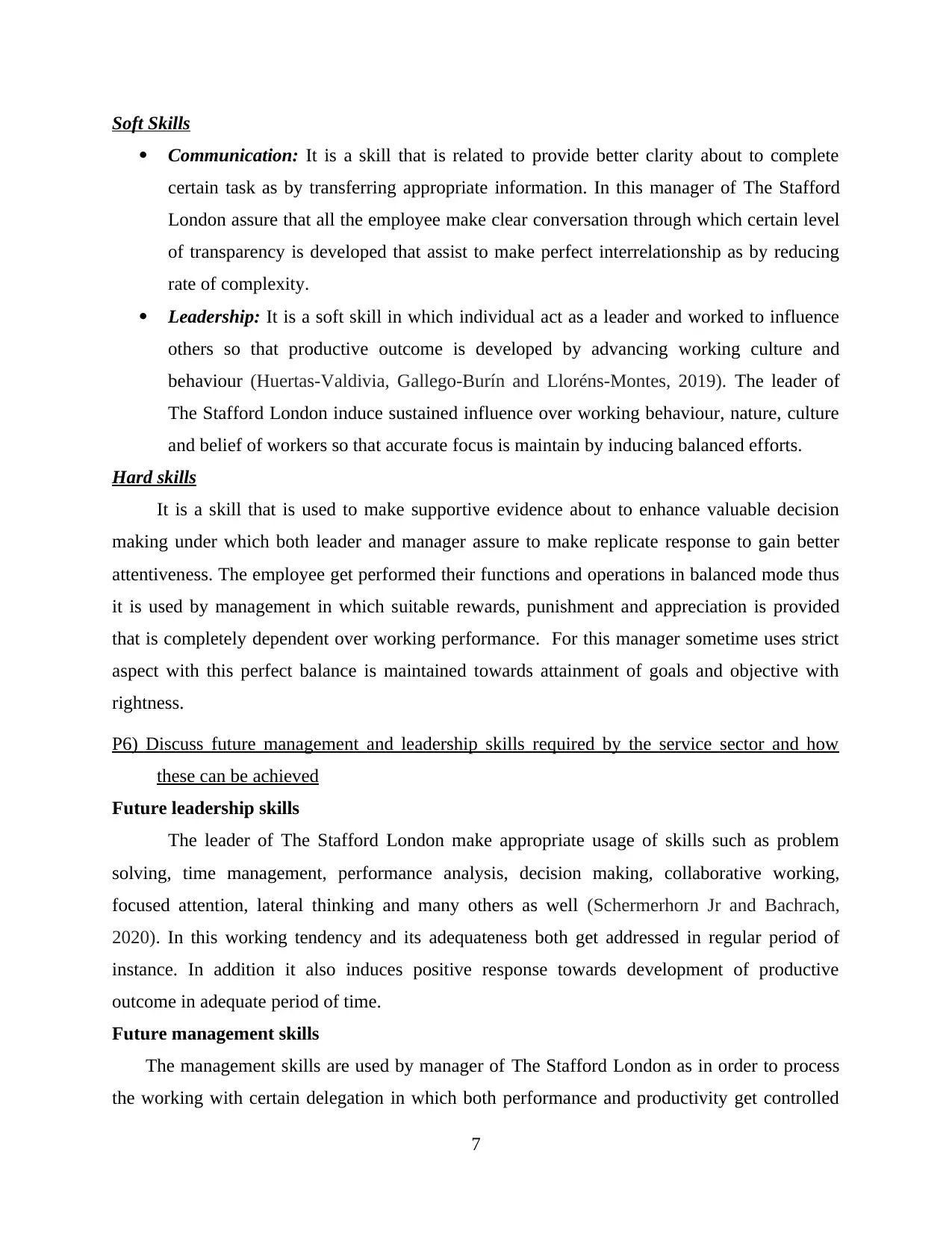
Soft Skills
Communication: It is a skill that is related to provide better clarity about to complete
certain task as by transferring appropriate information. In this manager of The Stafford
London assure that all the employee make clear conversation through which certain level
of transparency is developed that assist to make perfect interrelationship as by reducing
rate of complexity.
Leadership: It is a soft skill in which individual act as a leader and worked to influence
others so that productive outcome is developed by advancing working culture and
behaviour (Huertas-Valdivia, Gallego-Burín and Lloréns-Montes, 2019). The leader of
The Stafford London induce sustained influence over working behaviour, nature, culture
and belief of workers so that accurate focus is maintain by inducing balanced efforts.
Hard skills
It is a skill that is used to make supportive evidence about to enhance valuable decision
making under which both leader and manager assure to make replicate response to gain better
attentiveness. The employee get performed their functions and operations in balanced mode thus
it is used by management in which suitable rewards, punishment and appreciation is provided
that is completely dependent over working performance. For this manager sometime uses strict
aspect with this perfect balance is maintained towards attainment of goals and objective with
rightness.
P6) Discuss future management and leadership skills required by the service sector and how
these can be achieved
Future leadership skills
The leader of The Stafford London make appropriate usage of skills such as problem
solving, time management, performance analysis, decision making, collaborative working,
focused attention, lateral thinking and many others as well (Schermerhorn Jr and Bachrach,
2020). In this working tendency and its adequateness both get addressed in regular period of
instance. In addition it also induces positive response towards development of productive
outcome in adequate period of time.
Future management skills
The management skills are used by manager of The Stafford London as in order to process
the working with certain delegation in which both performance and productivity get controlled
7
Communication: It is a skill that is related to provide better clarity about to complete
certain task as by transferring appropriate information. In this manager of The Stafford
London assure that all the employee make clear conversation through which certain level
of transparency is developed that assist to make perfect interrelationship as by reducing
rate of complexity.
Leadership: It is a soft skill in which individual act as a leader and worked to influence
others so that productive outcome is developed by advancing working culture and
behaviour (Huertas-Valdivia, Gallego-Burín and Lloréns-Montes, 2019). The leader of
The Stafford London induce sustained influence over working behaviour, nature, culture
and belief of workers so that accurate focus is maintain by inducing balanced efforts.
Hard skills
It is a skill that is used to make supportive evidence about to enhance valuable decision
making under which both leader and manager assure to make replicate response to gain better
attentiveness. The employee get performed their functions and operations in balanced mode thus
it is used by management in which suitable rewards, punishment and appreciation is provided
that is completely dependent over working performance. For this manager sometime uses strict
aspect with this perfect balance is maintained towards attainment of goals and objective with
rightness.
P6) Discuss future management and leadership skills required by the service sector and how
these can be achieved
Future leadership skills
The leader of The Stafford London make appropriate usage of skills such as problem
solving, time management, performance analysis, decision making, collaborative working,
focused attention, lateral thinking and many others as well (Schermerhorn Jr and Bachrach,
2020). In this working tendency and its adequateness both get addressed in regular period of
instance. In addition it also induces positive response towards development of productive
outcome in adequate period of time.
Future management skills
The management skills are used by manager of The Stafford London as in order to process
the working with certain delegation in which both performance and productivity get controlled
7
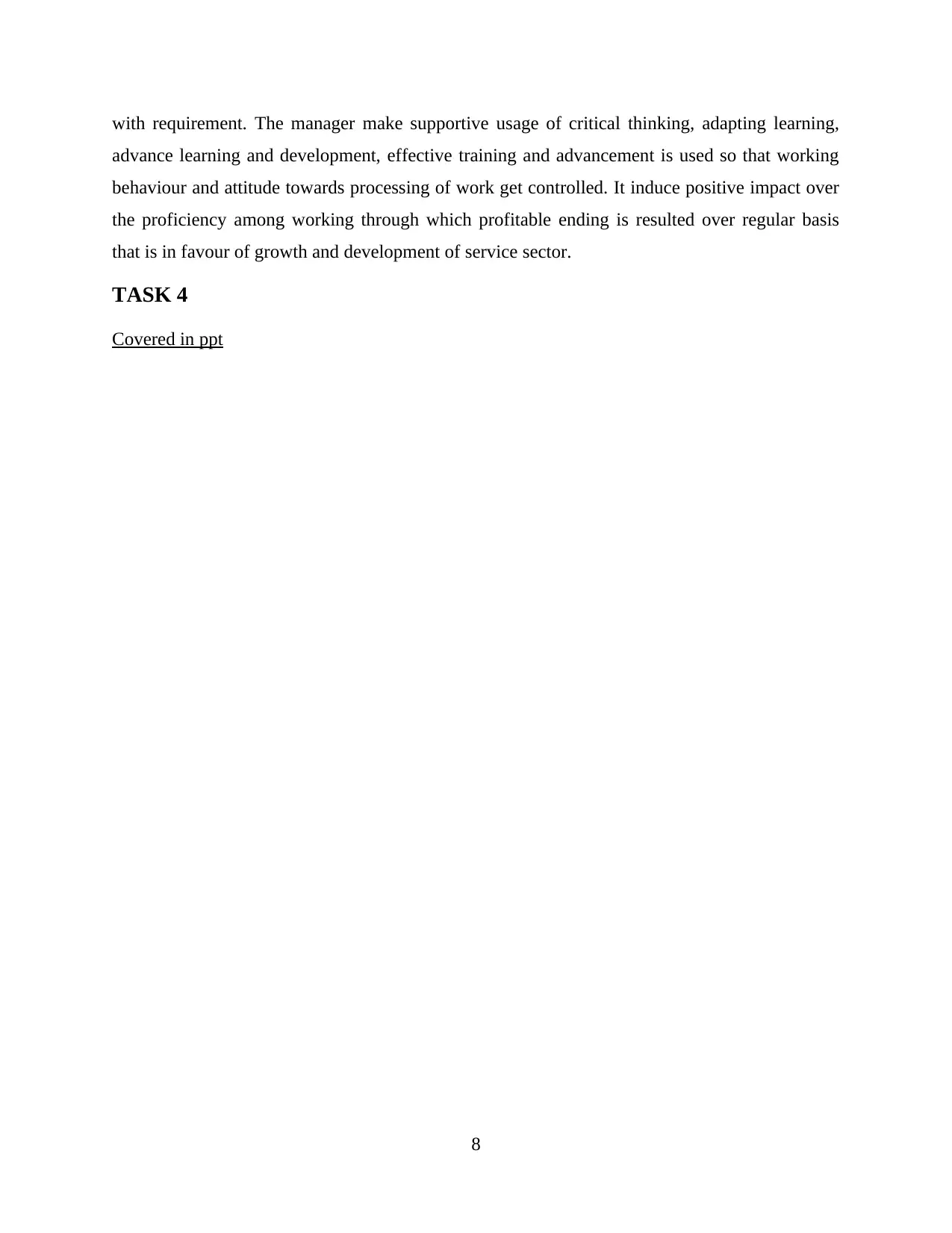
with requirement. The manager make supportive usage of critical thinking, adapting learning,
advance learning and development, effective training and advancement is used so that working
behaviour and attitude towards processing of work get controlled. It induce positive impact over
the proficiency among working through which profitable ending is resulted over regular basis
that is in favour of growth and development of service sector.
TASK 4
Covered in ppt
8
advance learning and development, effective training and advancement is used so that working
behaviour and attitude towards processing of work get controlled. It induce positive impact over
the proficiency among working through which profitable ending is resulted over regular basis
that is in favour of growth and development of service sector.
TASK 4
Covered in ppt
8
Secure Best Marks with AI Grader
Need help grading? Try our AI Grader for instant feedback on your assignments.
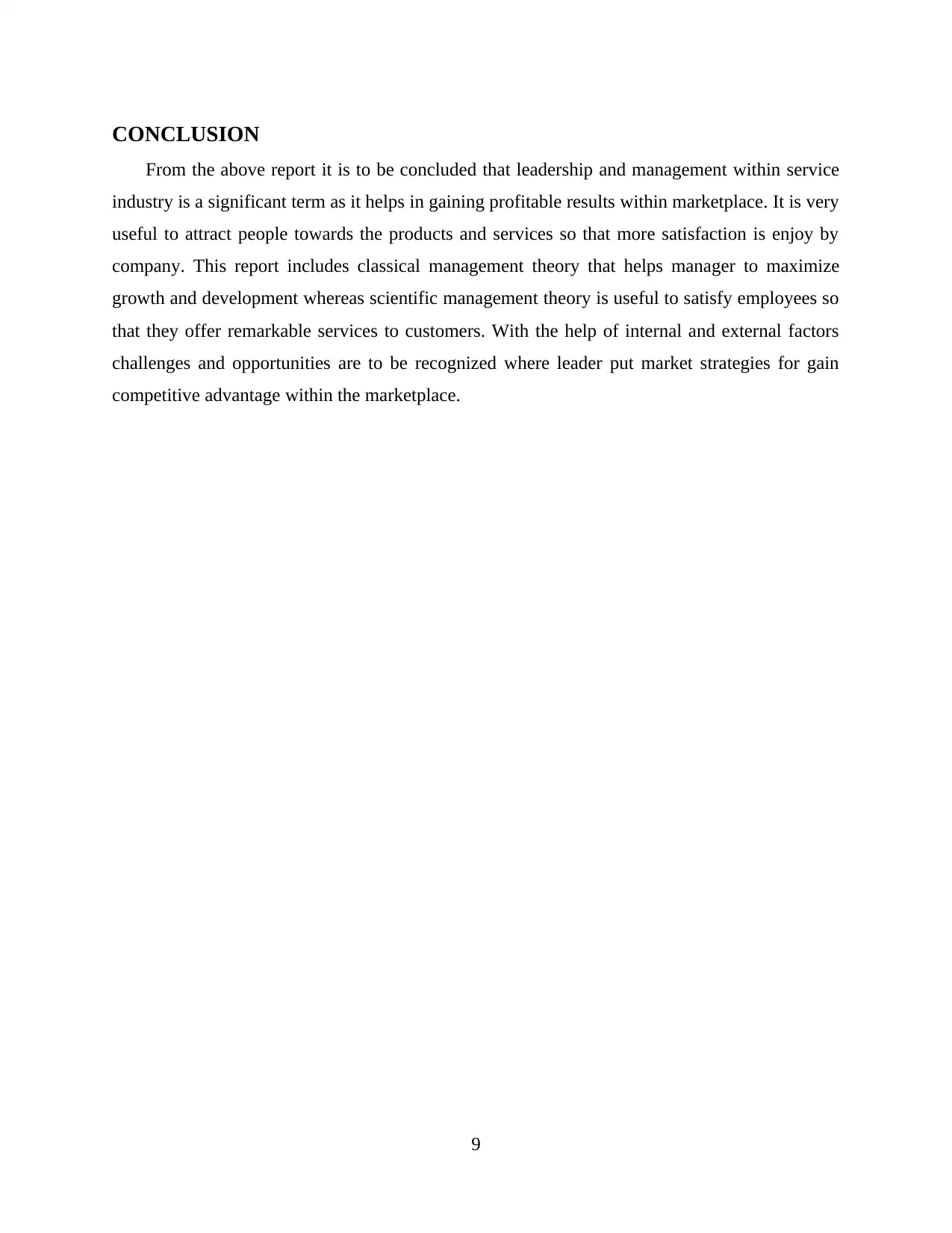
CONCLUSION
From the above report it is to be concluded that leadership and management within service
industry is a significant term as it helps in gaining profitable results within marketplace. It is very
useful to attract people towards the products and services so that more satisfaction is enjoy by
company. This report includes classical management theory that helps manager to maximize
growth and development whereas scientific management theory is useful to satisfy employees so
that they offer remarkable services to customers. With the help of internal and external factors
challenges and opportunities are to be recognized where leader put market strategies for gain
competitive advantage within the marketplace.
9
From the above report it is to be concluded that leadership and management within service
industry is a significant term as it helps in gaining profitable results within marketplace. It is very
useful to attract people towards the products and services so that more satisfaction is enjoy by
company. This report includes classical management theory that helps manager to maximize
growth and development whereas scientific management theory is useful to satisfy employees so
that they offer remarkable services to customers. With the help of internal and external factors
challenges and opportunities are to be recognized where leader put market strategies for gain
competitive advantage within the marketplace.
9
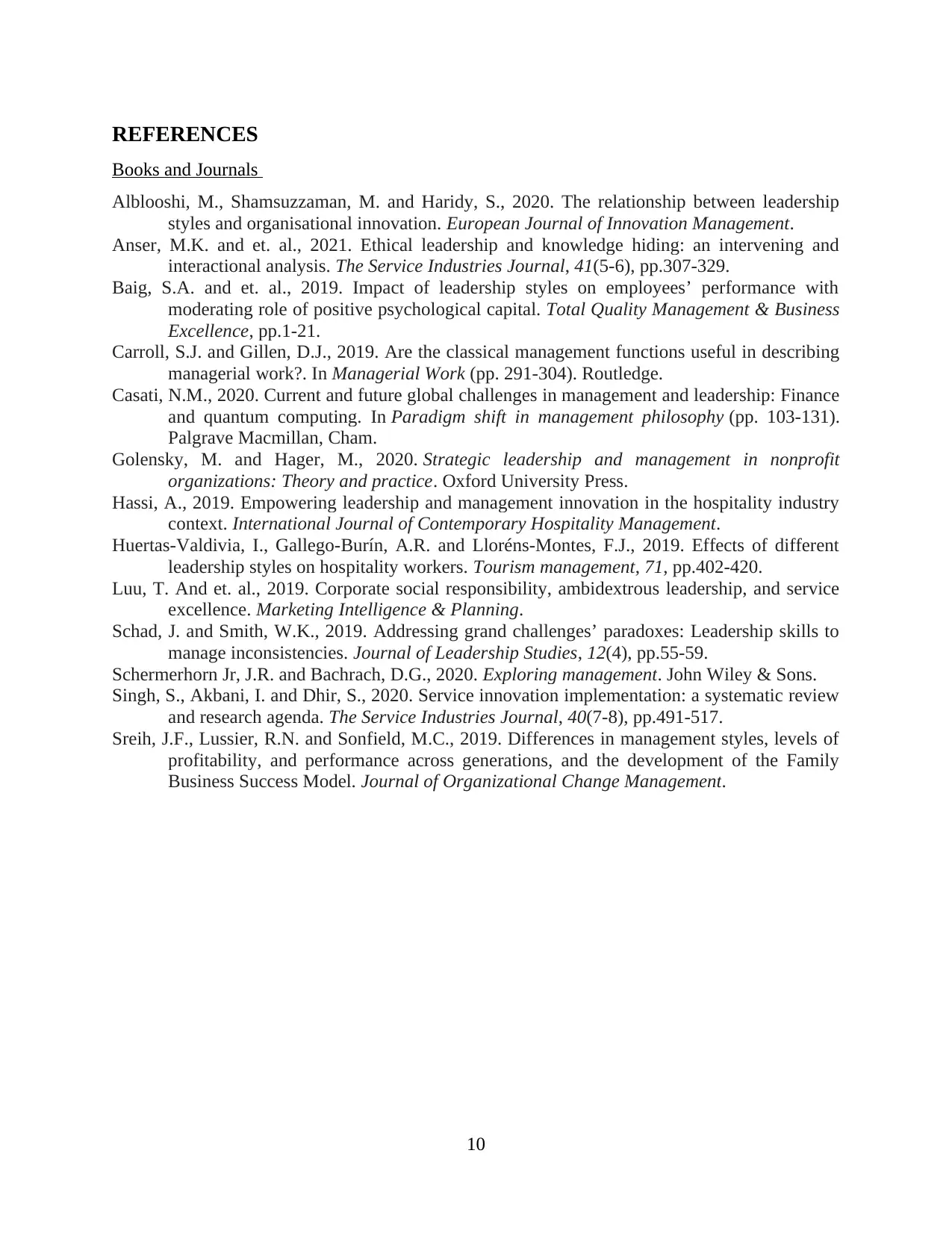
REFERENCES
Books and Journals
Alblooshi, M., Shamsuzzaman, M. and Haridy, S., 2020. The relationship between leadership
styles and organisational innovation. European Journal of Innovation Management.
Anser, M.K. and et. al., 2021. Ethical leadership and knowledge hiding: an intervening and
interactional analysis. The Service Industries Journal, 41(5-6), pp.307-329.
Baig, S.A. and et. al., 2019. Impact of leadership styles on employees’ performance with
moderating role of positive psychological capital. Total Quality Management & Business
Excellence, pp.1-21.
Carroll, S.J. and Gillen, D.J., 2019. Are the classical management functions useful in describing
managerial work?. In Managerial Work (pp. 291-304). Routledge.
Casati, N.M., 2020. Current and future global challenges in management and leadership: Finance
and quantum computing. In Paradigm shift in management philosophy (pp. 103-131).
Palgrave Macmillan, Cham.
Golensky, M. and Hager, M., 2020. Strategic leadership and management in nonprofit
organizations: Theory and practice. Oxford University Press.
Hassi, A., 2019. Empowering leadership and management innovation in the hospitality industry
context. International Journal of Contemporary Hospitality Management.
Huertas-Valdivia, I., Gallego-Burín, A.R. and Lloréns-Montes, F.J., 2019. Effects of different
leadership styles on hospitality workers. Tourism management, 71, pp.402-420.
Luu, T. And et. al., 2019. Corporate social responsibility, ambidextrous leadership, and service
excellence. Marketing Intelligence & Planning.
Schad, J. and Smith, W.K., 2019. Addressing grand challenges’ paradoxes: Leadership skills to
manage inconsistencies. Journal of Leadership Studies, 12(4), pp.55-59.
Schermerhorn Jr, J.R. and Bachrach, D.G., 2020. Exploring management. John Wiley & Sons.
Singh, S., Akbani, I. and Dhir, S., 2020. Service innovation implementation: a systematic review
and research agenda. The Service Industries Journal, 40(7-8), pp.491-517.
Sreih, J.F., Lussier, R.N. and Sonfield, M.C., 2019. Differences in management styles, levels of
profitability, and performance across generations, and the development of the Family
Business Success Model. Journal of Organizational Change Management.
10
Books and Journals
Alblooshi, M., Shamsuzzaman, M. and Haridy, S., 2020. The relationship between leadership
styles and organisational innovation. European Journal of Innovation Management.
Anser, M.K. and et. al., 2021. Ethical leadership and knowledge hiding: an intervening and
interactional analysis. The Service Industries Journal, 41(5-6), pp.307-329.
Baig, S.A. and et. al., 2019. Impact of leadership styles on employees’ performance with
moderating role of positive psychological capital. Total Quality Management & Business
Excellence, pp.1-21.
Carroll, S.J. and Gillen, D.J., 2019. Are the classical management functions useful in describing
managerial work?. In Managerial Work (pp. 291-304). Routledge.
Casati, N.M., 2020. Current and future global challenges in management and leadership: Finance
and quantum computing. In Paradigm shift in management philosophy (pp. 103-131).
Palgrave Macmillan, Cham.
Golensky, M. and Hager, M., 2020. Strategic leadership and management in nonprofit
organizations: Theory and practice. Oxford University Press.
Hassi, A., 2019. Empowering leadership and management innovation in the hospitality industry
context. International Journal of Contemporary Hospitality Management.
Huertas-Valdivia, I., Gallego-Burín, A.R. and Lloréns-Montes, F.J., 2019. Effects of different
leadership styles on hospitality workers. Tourism management, 71, pp.402-420.
Luu, T. And et. al., 2019. Corporate social responsibility, ambidextrous leadership, and service
excellence. Marketing Intelligence & Planning.
Schad, J. and Smith, W.K., 2019. Addressing grand challenges’ paradoxes: Leadership skills to
manage inconsistencies. Journal of Leadership Studies, 12(4), pp.55-59.
Schermerhorn Jr, J.R. and Bachrach, D.G., 2020. Exploring management. John Wiley & Sons.
Singh, S., Akbani, I. and Dhir, S., 2020. Service innovation implementation: a systematic review
and research agenda. The Service Industries Journal, 40(7-8), pp.491-517.
Sreih, J.F., Lussier, R.N. and Sonfield, M.C., 2019. Differences in management styles, levels of
profitability, and performance across generations, and the development of the Family
Business Success Model. Journal of Organizational Change Management.
10
1 out of 12
Related Documents
Your All-in-One AI-Powered Toolkit for Academic Success.
+13062052269
info@desklib.com
Available 24*7 on WhatsApp / Email
![[object Object]](/_next/static/media/star-bottom.7253800d.svg)
Unlock your academic potential
© 2024 | Zucol Services PVT LTD | All rights reserved.





